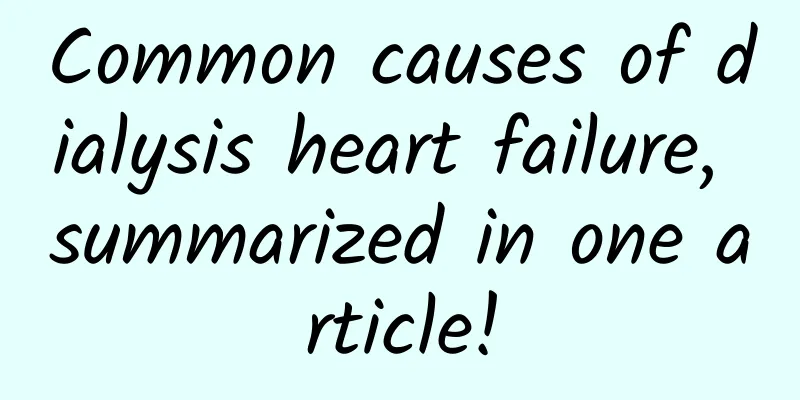Common causes of dialysis heart failure, summarized in one article!

|
1. Excessive capacity load The renal drainage function of dialysis patients is impaired. If water intake is not strictly controlled between dialysis sessions, drinking a large amount of water in a short period of time will cause excessive fluid retention in the body. At the same time, insufficient ultrafiltration during dialysis cannot effectively remove excess water, leading to a continuous increase in blood volume, excessive heart load, and ultimately heart failure. For example, some patients gain weight beyond the prescribed range between dialysis sessions, which puts great pressure on the heart. 2. Poor control of hypertension Long-term high blood pressure will increase the afterload of the heart, requiring the heart to pump blood more vigorously. If the blood pressure of dialysis patients is at a high level for a long time and is not effectively controlled, the structure and function of the heart will gradually be damaged. For example, if the blood pressure is higher than 160/90 mmHg for a long time, the heart will be under high pressure for a long time, the myocardium will gradually thicken, and eventually lead to decreased heart function and heart failure. 3. Severe anemia Dialysis patients often have varying degrees of anemia, which can lead to insufficient oxygen supply to various tissues and organs of the body. In order to meet the needs of the body, the heart has to speed up the beating frequency and increase the output. If this continues for a long time, the burden on the heart will increase and it is easy to cause heart failure. If the hemoglobin level continues to be lower than 80g/L, the burden on the heart will increase significantly. 4. Electrolyte imbalance During dialysis, if electrolytes are imbalanced, especially potassium and calcium, it will affect the normal electrophysiological activity of the heart. For example, hyperkalemia can lead to heart conduction block, arrhythmia, and in severe cases, heart failure. In addition, hypocalcemia can also affect myocardial contractility and increase the risk of heart failure. |
<<: Long-term use of ticagrelor, these 5 medication details must be known
>>: How can patients on dialysis prevent heart failure? Here are 4 tips to help you!
Recommend
When taking atorvastatin, in addition to adverse reactions, you should also pay attention to interactions with other drugs
A friend left a message to Huazi, asking if there...
How to regulate menopause
When women enter menopause, their bodies change a...
Can I play badminton during menstruation?
Women who have the habit of exercising are genera...
Can I drink black chicken soup when I am pregnant?
Pregnant mothers need our meticulous care in all ...
What exactly does women’s vaginal discharge mean?
Some of you may be unfamiliar with vaginal discha...
xAd: 51% of mobile device users say they like mobile location-based advertising
199IT original compilation According to a Septemb...
What are the symptoms of unsuccessful pregnancy preservation?
For various reasons, many women need to protect t...
What to do if your menstrual period is dark, has blood clots, and has dysmenorrhea
Nowadays, most female friends will have those few...
What to do if breasts become smaller after weaning?
Many women will have small breasts after weaning ...
Uncovering the mysteries of chronic diseases: common types and the root causes
Uncovering the secrets of chronic diseases: commo...
What are the nutritional values of prunes? How many prunes can you eat in a day?
Vitamin A is a fat-soluble vitamin. It is extreme...
Will abortion cause habitual miscarriage?
What should you do if hasty abortion leads to hab...
Treatment of finger joint pain during confinement
I believe that many pregnant mothers have experie...
Why do some people not get drunk? Is it dangerous to turn pale when drinking?
Wine is a must-have drink for parties, and its ma...
I heard that chronic rhinitis can easily turn into acute rhinitis? Is this true?
Chronic rhinitis and acute rhinitis are both comm...









